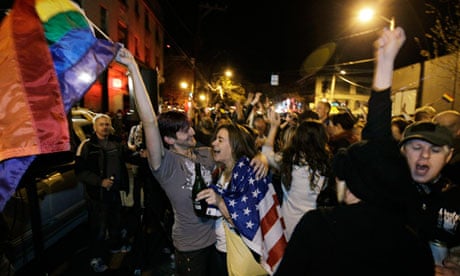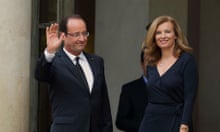Gay rights advocates say the US election was a tipping point in the battle for marriage equality and are readying themselves to take advantage of what they believe is an unstoppable cultural and generational shift in their favour.
On Tuesday, voters came out for marriage equality measures or against restrictions in four states. Each would have been considered a significant victory alone, but campaigners believe they have overturned a losing streak at the polls and knocked the wind out of the sails of their opponents.
Over the last 14 years, there have been 32 attempts to put gay marriage on the ballot, each ending in defeat.
Brian Ellner, of the marriage-equality group TheFour.com, said that the US was now on a "fast track" to federal acceptance of marriage equality. "My best estimate would have been two or three [ballot wins]," he said. "But to have all four is seismic and historic and opens a new chapter in this movement."
In Maine, Maryland and Washington, voters approved or ratified same-sex union initiatives on the ballot. In Minnesota, voters rejected a state constitutional amendment that would have banned it.
The results mean that gay, lesbian and bisexual couples can now marry in nine states and the District of Columbia. The states in which legislative measures were already in place are Massachusetts, Iowa, Vermont, Connecticut, New Hampshire and New York.
Maryland will begin issuing marriage licences to same-sex couple on 1 January. Campaigners will now take the rights battle to four more states: New Jersey, Illinois, Delaware and Rhode Island. They will also focus attention on attempting to have same-sex marriage accepted federally.
Opponents of marriage equality have said that the four states that passed ballot measures were liberal-leaning, and have denied that the votes represented any cultural shift to acceptance. However, Ellner said that polls consistently show that young people are in favour of gay marriage, irrespective of politics, religions or gender.
"Our opponents are dinosaurs," he said. "They have said that the only way we have won is by left-leaning legislators and activist courts. But we have exploded that argument, as four very diverse states voted in favour."
None of the amendments passed by large margins and exit polls in every state showed that younger voters were more likely to support gay marriage.
Campaigners say they are now turning their attention to national acceptance.
Evan Wolfson, founder and director of Freedom To Marry, said the four wins had solidified "irrefutable momentum" in favour of same-sex marriage. "It will give greater confidence to the next wave of decision makers, lawmakers and even justices of the Supreme Court," he said.
Brian Brown, of the National Organization for Marriage, which helped to run opposition to same-sex marriage, said the ballot votes represented only a fundraising victory because opponents were greatly outspent in each of the four battles on election night. He denied the votes represented a turning point for marriage equality.
"Well, it was a very – it was a bad night for traditional marriage, and there was a pretty big Democratic wave that we got caught up in," Brown told NPR. "But the reality is that there aren't many more places that are as liberal as these states that have voted that don't already have same-sex marriage.
Wolfson said there were three reasons for the gains – the cumulative effect of the campaign's efforts to engage the public, the example set in places where same-sex marriage already exists – where people can "see with their own eyes that it helps families and no-one is hurt" – and better-run and earlier campaigns compared to 2008.
"My mantra is there is no marriage without engagement," he said. "The more we engage with people to think it through, the more support we get."
National surveys have shown a softening of attitudes towards same-sex marriage. In June, a CNN/ORC International poll found that a majority of Americans approved the legal recognition of same-sex marriages.
Chad Griffin, president of Human Rights Campaign, said, in a video posted on the organisation's website: "Years from now, we'll remember this election day as the most historic and the most important in the LGBT community."
However, Wolfson said campaigners still had work ahead of them to achieve full equality: "Although we have tremendous momentum and we now have nine states with the freedom to marry plus the District of Columbia and possibly California, we still have a lot of states where people don't have that freedom. We also have federal marriage discrimination."
The Defense of Marriage Act (Doma), a 1996 federal law, defines marriage as a union between a man and a woman and bars federal recognition of same-sex marriages. It also places restrictions on the raft of state laws that favour same-sex relationships. For instance, a couple legally married in New York can be discriminated against in other states, if they move to or receive inheritance in another state which does not recognise the union.
There were other wins for gay rights on Tuesday night. Tammy Baldwin, of Wisconsin, made history by becoming the first openly gay US senator.
Last year, the Barack Obama administration furthered gay rights with a number of initiatives, including repealing the "don't ask don't tell" policy in the military and giving instructions to the justice department to stop defending Doma in court, despite it having done so in the president's first two years in office.
Obama, who came out in favour of gay marriage earlier this year, has spoken repeatedly about repealing Doma. But Wolfson said: "He can't wave a magic wand and make it disappear." Wolfson said he would work with the president and "push if necessary" for the repeal of Doma. Obama has endorsed the Respect for Marriage Act, a bill put forward by Freedom to Marry to overturn Doma.
The Supreme Court could decide in the next year whether it is constitutional for states to ban gay marriage or for the federal government to withhold recognition when states allow it.
Ellner said he hoped justices would take note of what voters had said on Tuesday: "The result means that America is ready and I hope the courts will do a bold thing and find that there is a fundamental right to marriage equality."
Campaigners are also watching the Supreme Court to find out if it will decide to review a 9th circuit court of appeals decision on Proposition 8, a ban on same-sex marriage that was approved by Californian voters four years ago. The decision of a panel of the 9th circuit found that the initiative unconstitutionally deprived gay and lesbian couples of marriage rights.
If the court does not take it up, same-sex marriage is expected to be restored in California.






Comments (…)
Sign in or create your Guardian account to join the discussion